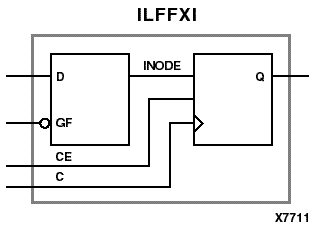|
|
|
|
|
|
| XC3000 | XC4000E | XC4000X | XC5200 | XC9000 | Spartan | SpartanXL | Spartan2 | Virtex |
|---|---|---|---|---|---|---|---|---|
| N/A | N/A | Primitive | N/A | N/A | N/A | Primitive | N/A | N/A |

ILFFXI, an optional latch that drives the input flip-flop, allows the very fast capture of input data. Located on the input side of an IOB, the latch is latched by the output clock - the clock used for the output flip-flop - rather than the input clock. Thus, two different clocks can be used to clock the two input storage elements. See “Block Diagram of XC4000X IOB” figure in the ILFFX section. After the data is captured, it is then synchronized to the internal clock by the IOB flip-flop.
The latch input (D) is connected to an IPAD or an IOPAD (without using an IBUF). When the gate input (GF) is Low, the data at the input (D) appears at INODE and is stored during the Low-to-High GF transition. The captured INODE data appears at output (Q) during a Low-to-High clock (C) transition.
This component is identical to ILFFX except that on active GSR it is preset instead of cleared. The latch is asynchronously preset, output High, when power is applied. FPGAs simulate power-on when global set/reset (GSR) is active. GSR defaults to active-High but can be inverted by adding an inverter in front of the GSR input of the STARTUP symbol.